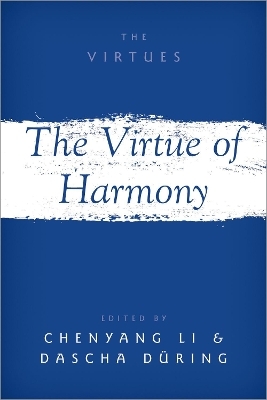
The Virtue of Harmony
Oxford University Press Inc (Verlag)
978-0-19-759849-8 (ISBN)
- Lieferbar
- Versandkostenfrei
- Auch auf Rechnung
- Artikel merken
The volume comprises thirteen essays that examine harmony against different cultural and disciplinary backgrounds. A broad variety of cultural traditions are represented, including the Confucian, Daoist, Buddhist, Judaist, Greek, Christian, Islamic, African, and Native American traditions. The volume's essays also represent different disciplinary approaches, such as philosophy, religious studies, linguistics, psychology, and political theory. Each contribution focuses on some aspect of what harmony as a personal trait, social disposition, or environmental outlook entails and describes how the virtue may be cultivated-either by examining the way in which it has been discussed in specific traditions of ethical, religious, or political thought, or by developing a cross-cultural analysis of the theory and practice of the virtue of harmony.
Chenyang Li is Professor of Philosophy at Nanyang Technological University, Singapore, where he founded the philosophy program. His primary areas of research are Chinese philosophy and comparative philosophy. He is author or editor of eighteen books, including The Confucian Philosophy of Harmony (Routledge, 2014), The Tao Encounters the West (SUNY Press, 1999), The Sage and the Second Sex (The Open Court, 2000), with Daniel Bell The East Asian Challenge for Democracy (Cambridge University Press, 2013), with Peimin Ni Moral Cultivation and Confucian Character (SUNY Press, 2014), with Franklin Perkins Chinese Metaphysics and Its Problems (Cambridge University Press, 2015), and most recently (with Dascha Düring and Sai Hang Kwok) edited the volume Harmony in Chinese Thought: A Philosophical Introduction (Rowman & Littlefield, 2021). He was a senior visiting fellow at the City University of Hong Kong, an American Council on Education ACE fellow, and an inaugural Berggruen Fellow at the Center for Advanced Study in the Behavioural Sciences at Stanford University. Dascha Düring received her PhD in cross-cultural philosophy from Utrecht University (the Netherlands) in 2018, and worked as postdoctoral research fellow of the School of Humanities, Nanyang Technological University (Singapore). She has published on harmony in Confucian philosophy and on its relation to feminist thought. Together with Chenyang Li, she was guest editor of a special issue on harmony of the Journal of East-West Thought and editor (with Chenyang Li and Sai Hang Kwok) of the volume Harmony in Chinese Thought: A Philosophical Introduction (Rowman & Littlefield, 2021). She currently works as ethics and scientific integrity trainer at Tilburg University in the Netherlands.
Series Editor's Foreword
Introduction, Chenyang Li & Dascha Düring
Chapter 1: Harmony as a Virtue in Confucianism, Chenyang Li & Dascha Düring
Chapter 2: Harmony through Diversity in the Huainanzi, Franklin Perkins
Chapter 3: Harmony as a Collective Virtue in Ashokan Inscriptions, Rajeev Bhargava
Chapter 4: Harmony as Virtue in Buddhist Ethics, Jens Schlieter
Chapter 5: Plotinus on Virtue as Harmony, Giannis Stamatellos
Chapter 6: Harmony as Virtue in Judaism, Maren R. Niehoff
Chapter 7: The Concept of Harmony in Islamic Thought and Practice, Asma Afsaruddin
Chapter 8: Bizaanate, Bangan, Waanaki: An Anishinaabe Theory of Harmony, Margaret Noodin
Chapter 9: Virtue in African Ethics as Living Harmoniously, Thaddeus Metz
Chapter 10: Harmony as a Virtue in Christianity, Robert Cummings Neville
Chapter 11: The Investigation of Harmony in Psychological Research, Antonella Delle Fave, Marié P. Wissing, Ingrid Brdar
Chapter 12: Seeking Linguistic Harmony: Three Perspectives, Rebecca L. Oxford
Chapter 13: Freedom and Harmony, Philip Pettit
| Erscheinungsdatum | 09.03.2022 |
|---|---|
| Reihe/Serie | The Virtues |
| Verlagsort | New York |
| Sprache | englisch |
| Maße | 210 x 141 mm |
| Gewicht | 463 g |
| Themenwelt | Geisteswissenschaften ► Philosophie ► Ethik |
| Geisteswissenschaften ► Philosophie ► Östliche Philosophie | |
| Geisteswissenschaften ► Psychologie ► Allgemeine Psychologie | |
| Geisteswissenschaften ► Psychologie ► Verhaltenstherapie | |
| ISBN-10 | 0-19-759849-8 / 0197598498 |
| ISBN-13 | 978-0-19-759849-8 / 9780197598498 |
| Zustand | Neuware |
| Informationen gemäß Produktsicherheitsverordnung (GPSR) | |
| Haben Sie eine Frage zum Produkt? |
aus dem Bereich


